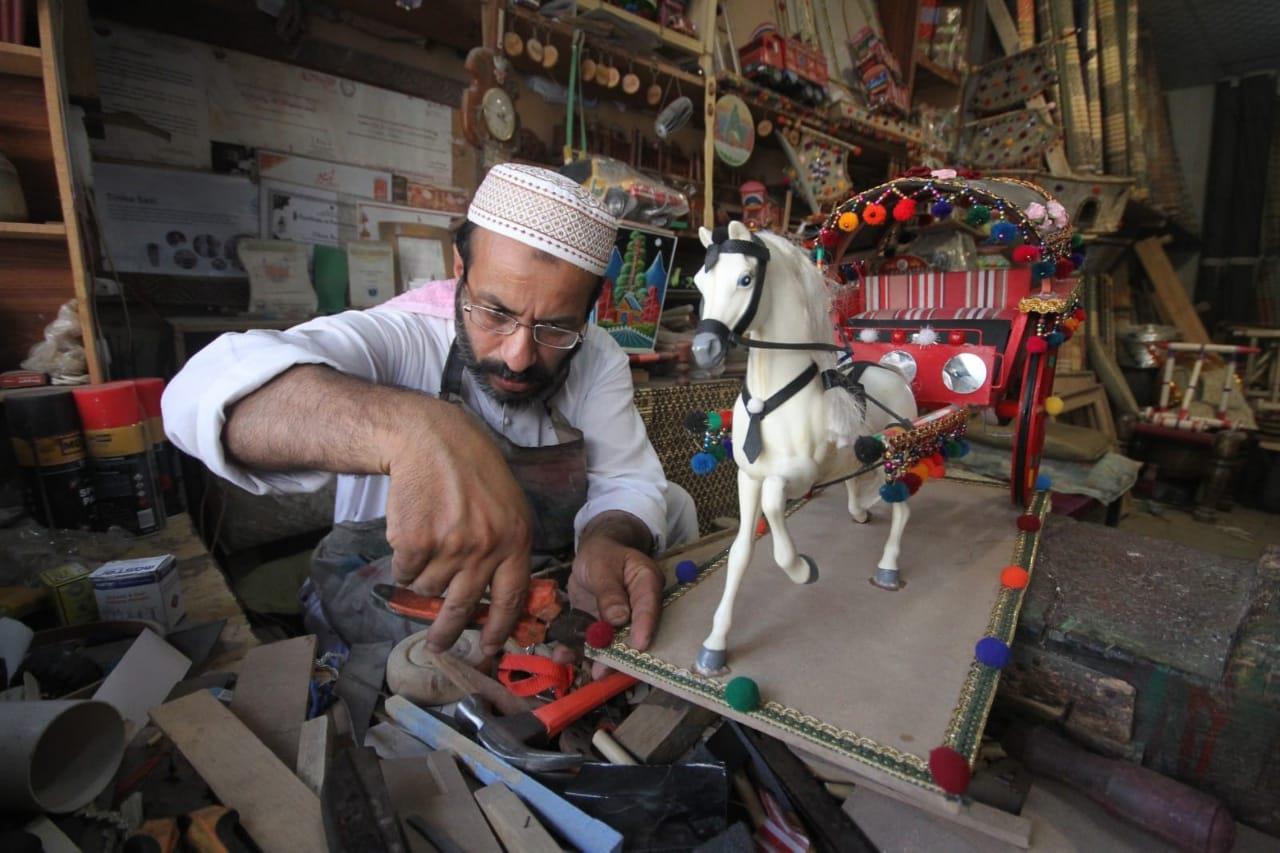
Crafting Heritage: Niaz Ali's Journey In Preserving Traditional Woodwork Amid Economic Challenges
The Dabgari Bazaar in Peshawar is renowned for its shops selling charpoys, bedding, quilts, and slingshots. Among the numerous display centers showcasing wooden items and other artifacts is a workshop owned by Niaz Ali, a skilled woodcarver.
Niaz Ali, 48, has been practicing his craft for the past 35 years. His family has a long tradition of working in joinery, and he learned the trade from his grandfather, who used to make charpoy legs, utensils, and other wooden items.
“When I was a little boy, I once made a wooden truck for myself using glue. That's when I discovered my flair for handicraft-making. I shared the idea with my grandfather, who initially didn't take it seriously. But over time, my passion for handicrafts continued to grow, and soon I began carving trucks, horse carriages, and rickshaws out of wood,” Niaz shared, reflecting on his journey.
Also Read: Court Initiates Proceedings to Declare CM Ali Amin Gandapur an Absconder in PTI Long March Vandalism Case
His shop, located near his workshop, offers a wide range of items, including grocery baskets, bread baskets, picture frames, bird nests, hand fans, and straw floor mats. Additionally, he sells wooden trucks, horse carriages, jeeps, kitchen stools, wall clocks, walking sticks, and miniature charpoys and tablas. Some of the products come from other home-based artisans, including women who cannot afford to open their shops.
A passerby, a woman, was intrigued by a pair of mirror-embroidered hand fans. She explained,“In Pashtun tradition, the bride's family gifts a pair of such hand fans as part of her dowry.” However, the price was beyond her budget, and she moved on.
Pointing to an unfinished horse carriage he was working on, Niaz said,“It will take two more days to complete. The finer the work, the more time it requires. Some items, like a truck, can take nearly a week to finish. But with the ongoing economic crisis, people can't afford decorative items; they have to prioritize their basic needs within their limited income,” he explained.
When asked if he regrets choosing handicrafts over more lucrative fields like carpentry and joinery, Niaz replied that since 2009, the province's Tourism and Culture Department has been inviting him to national-level exhibitions to showcase his art. "I demonstrate my craft live at these events," he said. "Every year, I set up a stall at the Lok Virsa Heritage Museum in Islamabad. It's heartening to hear from visitors that they wait all year just to purchase my creations," he added with pride.
Displaying the certificates he received from government departments at his workshop, Niaz aspires to earn the Presidential Award. He mentioned being nominated thrice by the KP Culture and Tourism Department, though the nominations are yet to be approved at the national level.
While Niaz Ali hasn't participated in any international exhibitions, his artifacts have been taken abroad by visiting buyers. Recently, an American visitor commissioned a wooden model of a truck, and the company later sent him a reward for his intricate craftsmanship. Civil engineering students also seek him out to create models for their projects, such as factories, flyovers, and plazas. For schoolchildren, he crafts straw house projects, and he recently made a wooden F-16 fighter jet for a student.“My art is a gift from God, and I'm grateful for it,” he added.
In 2012, when the Khyber Pakhtunkhwa (KP) government established an Artisan Village within the historic Gor Khatri Archaeological Complex in Peshawar to revive the city's fading arts and crafts, Niaz Ali was invited to join as a trainer. However, he declined the offer, citing the low salary, which wouldn't cover his rent, shop, and daily expenses.
Niaz Ali expressed concern that, aside from teaching his two sons, he hasn't had the opportunity to share his craft with others. He believes that by creating a supportive environment for artisans and providing formal training, the KP government can help preserve these traditional skills for future generations.
He emphasized that the authorities should establish an institute dedicated to traditional crafts, offering reasonable salaries to trainers. This would allow artisans to pass on their invaluable skills, as many of these arts are gradually fading away.
(The writer is a Peshawar-based journalist & can be reached at [email protected] )

Legal Disclaimer:
MENAFN provides the
information “as is” without warranty of any kind. We do not accept
any responsibility or liability for the accuracy, content, images,
videos, licenses, completeness, legality, or reliability of the information
contained in this article. If you have any complaints or copyright
issues related to this article, kindly contact the provider above.
















Comments
No comment